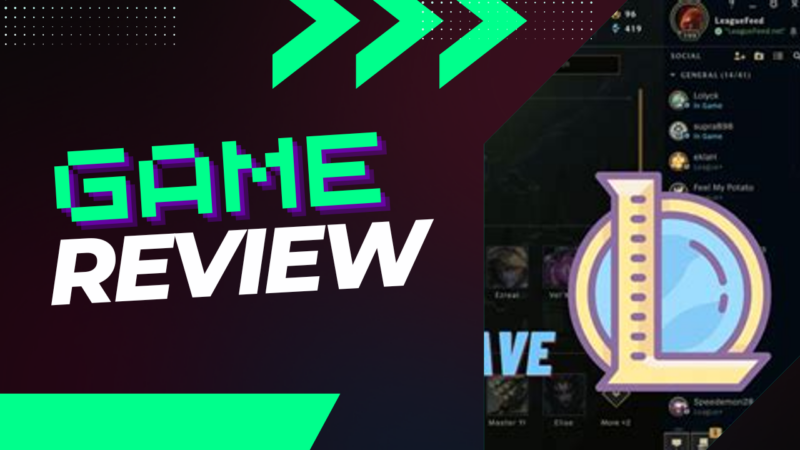Have you ever stopped mid-match, only to wonder how many times you’ve dived into the chaotic realm of League of Legends? Your gaming journey, filled with triumphs and epic fails, deserves a spotlight. The beauty of this virtual battleground doesn’t just lie in the champions you’ve mastered, but also in the countless matches you’ve played that blend strategy, camaraderie, and inevitable rage-quits. Fear not; we’re here to guide you through a straightforward journey to uncover your total game count—a statistical treasure that reveals not just numbers, but memories forged in the heat of battle.
How to Determine the Total Number of League of Legends Games Played
Are you curious about the total number of League of Legends matches you’ve taken part in? If you find yourself pondering this question and seek a simple method to uncover this information without the need for extra software, you’re in the right place. In this guide, I’ll provide you with easy steps to accurately discover how many games you’ve played, ensuring direct access to this insightful statistic.
Understanding Ranked Game Count
Determining the number of ranked games you’ve participated in is a breeze, thanks to the built-in features of the League of Legends client. Unlike tracking your total matches across various game modes, ranked games are neatly organized. Just log into your account and head over to the Stats tab. Here, you’ll encounter a detailed breakdown of your gameplay with each game mode displayed separately, including your ranked matches, making it effortless to see your ranked game count at a glance.
Finding Normal Game Statistics
While discovering the number of normal League of Legends games played requires a few extra steps, it’s still a straightforward process. Here’s how to find that information:
- Visit op.gg: This website allows you to enter your summoner name and access a wealth of gameplay-related information.
- Go to the “Champions” tab: Look for this tab once you’re on the site.
- Select “Normal”: By doing so, the site will display the total number of normal games you have played.
And just like that, you’ll unveil the count of your normal League games! It’s a handy way to assess how much time you’ve dedicated to non-ranked matches. Does the number surprise you?
Unraveling Game Hours
Are you interested in how many hours you’ve devoted to League of Legends? This discovery can be just as intriguing as counting your matches. Thankfully, there’s a straightforward route to uncover this information, which reflects the enjoyment you’ve had rather than the time wasted. Pop over to wol.gg, a cleverly named site for “Wasted on League.” This site acknowledges that enjoying League is anything but wasted time; it’s a celebration of your enthusiasm for the game. To find out how many hours you’ve dedicated, just follow these steps:
- Go to WOL.GG.
- Enter your summoner’s name, similar to the process on OP.GG.
By completing these steps, the site will inform you of the total hours invested in the game. Prepare for a revelation—the numbers can stack up quickly. For instance, I realized I’ve played for 1,421 hours, vastly different from a friend’s 82 hours. This significant disparity highlights not only a preference but a profound love for the game. If you discover that your gaming hours surpass other activities, take it as a positive indication that you’ve found something that captivates you—a remarkable achievement. Celebrate your commitment to a pastime that brings you joy.
The Importance of Tracking Games
Keeping a close watch on the number of games you partake in is vital for improvement in essential areas, particularly in competitive environments like League of Legends. Below are some reasons why tracking is crucial:
- Identifying Patterns and Trends: Monitoring your game count allows you to discern patterns in your gameplay. This includes recognizing strengths and weaknesses across various phases, understanding which champions or roles you excel at, and identifying recurring errors. Such insights are invaluable for targeted practice and ongoing improvement.
- Setting and Achieving Goals: Keeping track of your games facilitates the establishment of specific, measurable improvement goals. Whether you’re aiming to boost your win rate, lower your average deaths, or improve your Creep Score (CS) per minute, a clear record helps you monitor your progress.
- Reflecting on Performance: Regular game reviews enable reflective learning. Analyzing both wins and losses provides insights into your decision-making, positioning, and overall strategy, key for learning from mistakes and celebrating progress.
- Time Management: For many players, gaming coexists with a busy schedule. Monitoring the number of games ensures that gaming remains a rewarding aspect of your life while balancing other responsibilities. It also allows for structured practice sessions, enhancing overall efficiency.
- Preventing Stress and Burnout: Keeping tabs on your game count can help evade gaming fatigue. By recognizing when you’re playing excessively without progressing, you can take breaks, adjust your goals, or modify your approach, avoiding frustration and ensuring a healthier gaming relationship.
- Benchmarking and Motivation: Tracking your games serves as a benchmark for improvement. Observing tangible advancements in your gameplay can be motivating, pushing you to continue honing your skills while seeing how you stack up against peers or higher-level players.
Strategies for Balanced Gaming and Mental Well-Being
Effectively managing your time to enhance your gaming skills while safeguarding your mental health is vital in the competitive gaming realm. Here are strategies to help maintain balance:
- Set Realistic Goals: Outline clear, achievable targets for your gaming experience. Whether enhancing your rank, mastering a new champion, or honing a specific skill, setting realistic objectives helps focus your practice and cultivates a sense of accomplishment.
- Create a Structured Schedule: Designate specific gaming hours, ensuring compatibility with other life commitments. This structure prevents excessive gaming time and supports a balanced lifestyle.
- Quality Over Quantity: Emphasize the quality of your gaming sessions over the quantity. Short, focused periods of practice aimed at improvement can be more beneficial than marathon gaming sessions that lead to exhaustion.
- Incorporate Breaks and Physical Activity: Frequent breaks during gaming help prevent mental fatigue, while physical activities, such as stretching or short walks, enhance both health and performance.
- Mindfulness and Stress Management: Employ mindfulness techniques like deep breathing, meditation, or yoga to manage stress, improve focus, and maintain a positive outlook.
- Socialize and Diversify Interests: Ensure that gaming doesn’t isolate you. Spend time with friends and explore hobbies outside of gaming to prevent burnout and support a well-rounded life.
- Reflect on Your Gaming Experience: Regularly assess gaming’s impact on your mood and mental health. If you spot negative trends, modify your habits accordingly.
- Seek Support When Needed: If feeling overwhelmed, don’t hesitate to share your experiences with friends, family, or professionals to alleviate concerns.
- Celebrate Your Achievements: Acknowledge your triumphs in gaming. Positive reinforcement can enhance self-esteem and motivation.
- Listen to Your Body and Mind: Stay aware of signs of fatigue or discomfort. If gaming detracts from happiness or health, take breaks to reassess your priorities.
Conclusion
Uncovering the total number of games you’ve played in League of Legends, alongside the time invested, can evoke a multitude of emotions. For many, it brings forth pride, showcasing dedication and passion for the game. Others may feel astonished or reflective upon recognizing the hours logged. Whether you’re reveling in a grand total akin to a friend’s staggering 2,248 hours or merely curious about your own gaming statistics, the journey of figuring it out is invaluable. Happy gaming!
Quick Steps to Check Your Total Games in LoL
If you want to know how to check the total number of games you’ve played, follow these simple steps:
- Open the League of Legends client.
- Click on your profile icon located in the corner.
- Find and click on the “Stats” tab.
- Hover your mouse over different statistics to delve into details.
Accessing Match History
To view your League of Legends match history, click on your profile icon in the top right corner.
Tracking Playtime in League
To check your total play hours in League of Legends, run the game on your PC. Instead of diving straight into a match, click on your profile tab, then select the “Stats” section on that menu.









